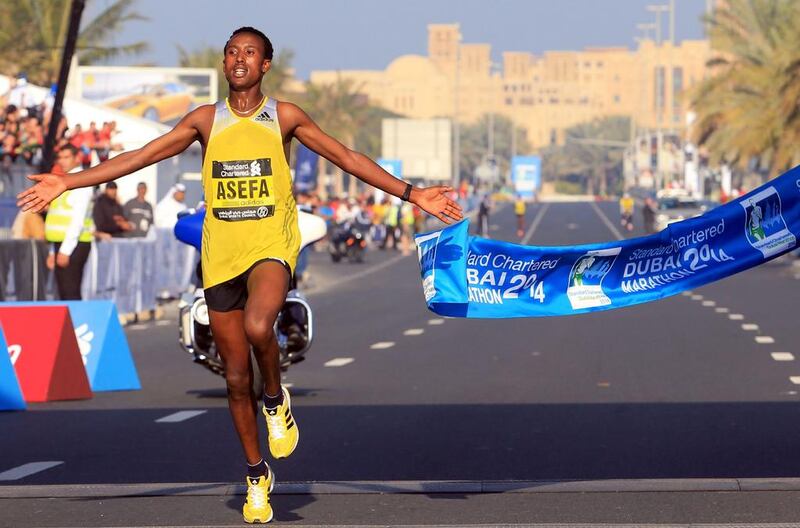DUBAI // Much can be said for marathons bringing communities closer.
A city that, at times, can feel disjointed by disparities in wealth appeared as one at the Standard Chartered Dubai Marathon on Friday. Emirati royalty ran alongside Filipinos who ran alongside European women who ran alongside Indian youths who ran alongside Africans who ran alongside silver-haired tourists.
And the Ethiopians, as they invariably do, set themselves apart from the rest of the field through their sheer inability to tire.
Tsegaye Mekonnen Asefa, on his marathon debut, took first place as he clocked the fastest time by an 18-year-old runner, while his compatriot, Mula Seboka Seyfu, was the first woman to cross the finish line. Of the 20 fastest men and women, 17 were from Ethiopia.
Even those not running showed East African indefatigability. At 7.20am and without an elite athlete in sight, a throng of colourful Ethiopians sang and banged drums and waved their country’s Lion of Judah flag. One hour and 44 minutes later, as Asefa completed his remarkable debut in two hours, four minutes and 32 seconds, nine seconds shy of the course record and 69 short of the world record, the din grew.
“This is my first competitive marathon and I was able to push from 30 kilometres,” said Asefa, who ran here as a pacemaker last year.
“Last year, a Kenyan took Haile Gebreselassie’s world record and I want to get it back. Now I have seen I have the ability to run sub-2:04, I have decided that I want to come back and get the world record for Ethiopia again.”
Wilson Kipsang Kiprotich ran the Berlin Marathon in 2:03:23 last September, and experts acknowledged a new world record was there for the taking on the streets of Dubai.
Organisers had laid out what they called “the world’s flattest marathon” and conditions were perfect, yet a combination of Asefa’s lack of experience and a group of excessively keen pacemakers meant the likelihood of a new record slowly ebbed as the race drew to a close.
Asefa was among a group of runners until the last five or six kilometres, when his rivals slipped back. When he noticed he was alone at the front he raised his arms in celebration, drawing condemnation from veteran analysts and perhaps costing himself a US$100,000 (Dh367,000) bonus for breaking the world record, in addition to the $200,000 he received for winning.
“He doesn’t know how to run a marathon,” one Italian journalist said. “He still has some way to go and could have beaten the world record, but he doesn’t know.”
Said Aouita, the Moroccan winner at the 1984 Olympic Games in the 5,000m, said Asefa missed the world record because of inexperience and poor race management.
It seemed received wisdom that Asefa would have shaved at least 30 seconds off his time had he run with somebody for the final few kilometres. Likewise, a slower start would have set him in better stead.
“If he had controlled his race better at the first part of the marathon, he would have broken the world record easy,” Aouita said. “When he was in the group, I thought he would break the record. In marathons, you have to control your race and the first half was a little too fast. Whoever starts fast, finishes weak.
“If there had been some athletes with him, pushing him, maybe he could still have achieved it, and if he had race experience, he probably would have managed it because the conditions were perfect. If it had been another athlete, somebody with experience like Gebrselassie, they would have broken the world record for sure. Of course, he cannot be perfect in his first race.”
Asefa conceded he struggled slightly in the closing stages as he pounded the road alone with little guidance as to what pace to keep.
Markos Geneti, who improved on his third-place finish in 2012 with second place on Friday, had helped Asefa during the middle of the race, but when his own pace slowed with a few kilometres left, the responsibility fell to Asefa.
He said that if the pacemaker had kept the race to one hour and two minutes at the halfway point, he could have broke the record.
“I could have done something in the last part,” said Asefa, who began running competitively four years ago after being selected for the World Junior Championships in Barcelona. “I had energy inside, but when I looked back and I was alone, I could not push myself.
“If somebody was with me, maybe we would have helped each other. With that, I could have beaten the course record. Instead, I found it very difficult in the second half, largely because I had lost a lot of power in that first part.”
Asefa’s victory made him the third Ethiopian debutant to win the Dubai Marathon in three years. After collecting a glass vase and a cheque for $200,000, he said he will use the winnings to buy a car and a house in Addis Ababa.
gmeenaghan@thenational.ae





